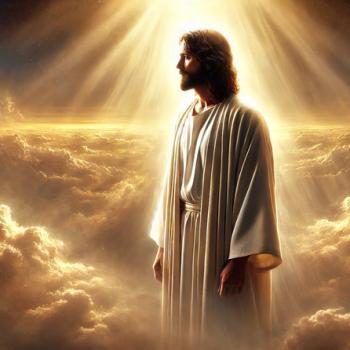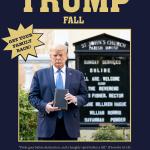
Throughout the summer, my wife — The Reverend Canon Natalie Van Kirk — and I have been preaching a series on the subject of doubt. We have been addressing both the subject of doubt itself and the questions that are often the source of trying questions for Christians, as well as others. Obviously, none of these articles are exhaustive but we hope that they will be a helpful stimulus to your own thinking.
Natalie writes:
In the course of parish ministry I have often had someone who really struggles with their faith tackle me at coffee hour or in my office. “I really want to believe,” the person says, “but I just can’t make myself do it.” No matter what is said, the conversation usually ends with that declaration. “I want to believe, but I just can’t.”
Part of the struggle for people in this situation arises out of a rather confused set of ideas about who God is and what God causes to happen in the world. In many cases, though not all, these ideas are the product of difficult experiences: the tragic death of a child, the death of a parent, or an encounter with the sort of brutal suffering that life can bring.
Another part of the struggle arises from the fact that, like almost everyone sitting in a pew on Sundays, many people are materialists and what they cannot perceive with their senses — or resolve with some fairly straightforward logic — does not seem possible or real.
But the root of all of their problems with their faith is that they want certainty. They want to know for sure—without any equivocating—who God is, what God does, and how they can perceive God. They do not want it to be anything complicated. They do not want to be forced to think hard about it.
As a result, their doubts seem to be an insurmountable mountain that they can neither scale nor ignore. Without the certainty that they seek, they think that the only way to come to faith is some sort of magical transformation, where you screw up your face really hard, stand on one foot, and force yourself to believe something fantastic.
All too often, we in the church ignore the doubts and questions of those sitting in our pews. It is time we start talking about doubt, skepticism, and certainty — about how all of these things can be useful and about how they can be abused. It we do not talk about them, we cannot help those who seem stuck at the foot of their mountain of doubt. So, at the outset we would like to address some of those issues.
Where does doubt come from? Doubt is a natural part of the human condition. It is not inherently bad. It probably stems from something psychologists call our “negativity bias,” and it was a survival instinct for our ancestors.
For example, if you were out, away from your clan at night, and you heard a rustling in the bushes around you, you could assume it was just small animals going about their nightly business. Or you could assume that — however unlikely — it was a lion that would kill you and eat you. If you opted to decide it was small animals rustling around, and you were wrong, it could be deadly.
If you assumed it was a lion and ran back to your clan, then regardless of what was actually in those bushes, you would still be alive. Faced with that choice: chose wrongly and you die — or chose wrongly and you live—you would run back to the clan as fast as you could. Short of certainty, the safe choice is the negative one.
Likewise, we are more negative and self-critical about our own abilities than we are about those of others. If you were out hunting or at war, being self-critical of your ability to throw a spear and bring down prey or a foe has a real benefit. Self-criticism assumes your skills can be improved and increases your chances of feeding and defending yourself.
The “negativity bias” is so deeply ingrained in human beings that we are absolutely inclined to believe any criticism or negative response we receive from others. But we need to hear praise or something affirming at least ten times before we actually accept it, and we need to hear something much more often before we can be certain and believe it deep in our bones.
The doubt created by our “negativity bias” wants answers. It loves certainty when it can get it. But short of certainty, we seek answers in what philosophers refer to as “cumulative case evidence”. If you approach a problem from different angles, with different questions, and with many iterations, and you tend to get answers that point to the same conclusion, then doubt will usually soften and relinquish its grip on us. If everything comes up the same — or close to it — then we typically assume that we have the right answer to our questions.
Doubt is common in adolescence and early adulthood. It is common among those who have known tragedy and suffering. Doubt can rise to the surface when we encounter someone who believes differently or who sees the world differently. In these situations, doubt can call into question everything we ever thought we believed.
When that happens, there are generally three ways we respond:
The first is to reject everything—God, religion, anything we were taught as children. This is often the response of young adults and those with little formation in the faith. The simplest objections and even transparent falsehoods can be enough to get young adults and adolescents to deconstruct everything they have ever believed.
The second response is to retreat into a rigid system of belief that accepts no questions at all and seals off doubts as evidence of a lack of faith. This response is common in fundamentalist communities. In those communities this response doesn’t just foreclose on answering questions, it makes it impossible to ask them; and those who do are often vilified for asking them and excluded from the community.
The third response is to question the assumptions of the faith with which we were raised, recognizing that there may be truth in it, as well as some error that needs to be explored and corrected. This approach is based upon the fact that even in faith communities, we grapple with complexities and with the limits that are part and parcel of being human and finite. It also assumes that asking questions can be the key to deeper faith and understanding.
In the Episcopal Church we love the people who have struggled with communities that have offered them the first two responses. Those responses hurt and wound people, and we want to offer them mercy and healing.
We also encourage the third response. We believe that asking questions can be a good thing. We also believe that both the Scripture and the traditions of the church are a durable source of hope. You can stomp on them with both of your intellectual feet, and they will speak to your questions and doubts.
Skepticism, on the other hand, is very different from doubt. Skepticism usually does not want an answer or even believe that one is possible. In religious matters it is usually a form of spiritual and intellectual pride.
Skeptical people often argue that “any intelligent person would agree with me.” And, of course, since we all want to be thought of as intelligent and knowledgeable, we are tempted to fall into line and parrot the skeptic’s point of view. No one wants to be considered foolish or naive.
A little bit of history, however, can inoculate us against that temptation. The Greek word skepsis originally became an “ism” around 1800, at the time of the French Revolution. While it was not universal, the hostility of the movement toward Christianity was enormous in some circles, especially some of the Revolution’s leading philophers and many of them sought nothing less than the destruction of the church.
By 1850 or so — not quite 200 years ago — skepticism had won the day. Philosophers and “intellectual sophisticates” declared that people had finally outgrown their need for the God of Christianity—at least the smart, northern European and American ones had—and that only the extremely naive and ignorant would cling to such illusions. There were no answers that Christianity could offer to their skepticism that they would entertain, much less accept.
As a result, those of us who are inheritors of their mindset were left with a misleading choice: either be a skeptic about any and all things religious and be thought of as intelligent, sophisticated, and a master of one’s own fate, or be hopelessly naive, and ignorant, believing in magic and fairy-tales — all too willing to let our lives be cramped and burdened by an oppressive, false religion. Framed in this fashion, of course, the better choice was obvious. After all, what would you prefer that people thought about you?
But, skepticism of this kind has two fatal flaws. The first is that it fails to see skepticism as a tool—a way of exploring questions and struggling with the answers. Instead, it inevitably becomes a weapon which smashes everything that challenges it, leaving in its wake only the most subjective and personal definitions of truth, beauty, goodness, or justice.
Think of it this way, suppose a sculptor has a block of marble. Skepticism, when used as a tool, allows the sculptor to chip away at the marble, revealing the truth and beauty hidden there. By contrast, skepticism used as a weapon replaces the chisel with a sledgehammer and smashes the block of marble, declaring there was nothing true or beautiful there. And, to make matters worse, if you do not agree, the sledgehammer can be turned on you.
The second fatal flaw of extreme skepticism is that in the end, you are left with nothing: a pile of marble shards, dust and rubble, but nothing true. And, without being able to know anything to be true, life becomes meaningless and finally pointless. In other words, skepticism of this kind is a dead end.
We would all like to be more certain. Is that a lion or a possum making the leaves rustle? In the end, though, faith will require that we accept certain things as true and live as though they are true. That is the case, whether one professes faith in the God of Christianity or the atheism of modern skepticism.
There are sound intellectual and moral reasons for someone to accept Christianity and live as though it is true, but Christianity still requires that step of faith that says God exists. Likewise, atheism requires that step of faith that says God does not exist. There is no irrefutable proof for the fundamental claims of Christianity or any other religion, just as there is no irrefutable proof of the atheist’s claim that there is no God.
At some point, however, we all need to commit. We cannot be caught forever in the paralysis of analysis, fearing to believe anything lest it turn out to be wrong.
I am a Christian. That is a good thing since I wear this collar and stand up, trying to teach the faith and celebrate and offer the sacraments every week. But I was a Christian before I was a priest. I tried to find ways around it, but none of the alternatives ever led to a more fulfilling and integrated life. In fact, everything went just the opposite way. And so, I started studying, praying, and doing my best to live as though I believed the teachings of the faith.
Have I had doubts since then? Sure. There are occasions when a voice on my shoulder says, “You know, none of this is true.” But, in all the years I have worked at being a Christian, I have yet to see anything which brings the healing, mercy, love, justice, and peace to hurting individuals and a hurting world that Christianity brings.
In Christ’s death we see what selfless sacrifice looks like, and we receive redemption from the sin and death which binds us as well as forgiveness for the ways we inflict pain on others and ourselves. In His resurrection we are given a vision of the creation restored and our true place in it. We see that God’s will is that life triumphs over death.
It has been a long journey, but in making that journey into Christianity I have been given a vision of human beings and human living in relationship to the Risen Christ that is more joyful, more awe inspiring, and more glorious than any I could ever have imagined. I could be wrong in the choice I have made, but I have never been presented with an alternative that actually works or that is truly based on love.
If only God were good at skywriting and would spell things out, then we could banish our doubts and defeat skepticism, right? If God would just arrange things so that we could be certain, then everyone would believe, right? Instead, God gives us mystery—things that are beyond our words and finite brains to fully explain and comprehend.
Trying to help those who struggle with doubt is always a challenge. But our doubts are not a mountain that is impossible to summit. There are many who are glad to accompany doubters on the journey. And, on the other side of doubt we are likely to look back and see that conquering our doubts was only a small step on a journey closer to God.

















